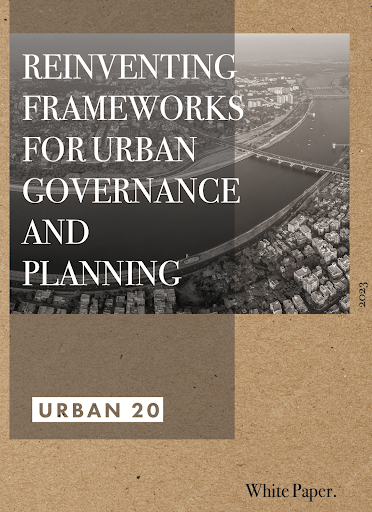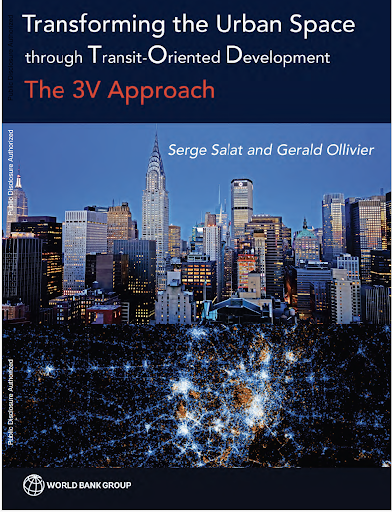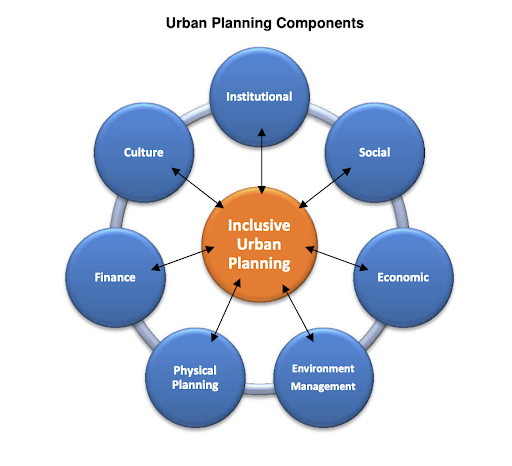
THEME OF THE FORTNIGHT
URBAN PLANNING
REPORTS
Reinventing Frameworks for Urban Governance and Planning

Authors: Task Force of Experts
Publication Details: Urban 20, 2023
The report explores innovative frameworks for urban governance and planning to address challenges posed by rapid urbanisation. It highlights the need for strategic planning approaches that are dynamic, inclusive, and adaptable across multiple scales. The document emphasises the importance of metropolitan governance for multi-jurisdictional urban patterns and proposes mechanisms for coordinated planning. It advocates for urban regeneration strategies to revitalise existing areas and improve infrastructure, economic productivity, and social equity. Flexible regulations, public-private partnerships, and data-driven decision-making are presented as key enablers. The paper calls for a transition from rigid, regulatory planning to outcome-oriented, enabling governance models.
Read More: https://www.urban20.org/wp-content/uploads/2023/11/RFGUP-White-Paper-1.pdf
Transforming the Urban Space Through Transit-Oriented Development: The 3V Approach

Authors: Serge Salat, Gerald Olliviere
Publication Details: The World Bank, 2017
Transit-oriented development (TOD) is a planning strategy that aims to concentrate jobs, housing, and services around public transport stations. From Copenhagen to Singapore, this approach has helped many cities reduce their carbon footprint while becoming more productive and more livable. However, TOD principles cannot be applied uniformly across an entire city or transit network. A new World Bank study recommends looking simultaneously at the “three values” (3V) of a neighbourhood—transit connectivity, quality of the urban environment, and market potential—to identify which stations are good candidates for TOD, and what kind of development makes sense in each neighbourhood.
Read More: https://openknowledge.worldbank.org/entities/publication/c66e4233-79c8-5cd2-acd5-e3d803a5e9a2
Urban Planning and Land Management for Promoting Inclusive Cities

Authors: Giovana Beltrão
Publication Details: Asian Development Bank, 2013
This paper explores key urban planning and land management principles as the foundation for India's National Housing Development Framework (NHDF). It examines various housing and planning typologies, including rental housing as an alternative to subsidised ownership for low-income groups (EWS and LIG). Additionally, it reviews existing housing policies and development models in Jodhpur and Ahmedabad.
Read More: https://www.adb.org/sites/default/files/project-documents//41609-012-tacr-01.pdf
RESEARCH PAPERS
Role of Green Space in Urban Planning: Outlook Towards Smart Cities
Authors: Ramesh Anguluri, Priya Narayanan
Publication Details: Urban Forestry & Urban Greening, Volume 25, 2017
The article highlights, the challenges of urbanisation, particularly the neglect of urban green spaces in transitioning countries. The article argues that the land allocation priorities for urban green cover are neglected or readily negotiated in countries that are in transition. Urbanisation devoid of urban green can cause many social and physical impacts on its residents. With this context, the article has devised a green index for the planning of smart cities. The devised green index has beed verified in the real-world context of Gulbarga City in India, thereby understanding the practicality of this index. The findings reveal areas with low green cover and suggest alternative solutions. The study also analyses intra-city green cover patterns, emphasising the need for green space in urban planning. Additionally, it correlates Land Surface Temperature (LST) with green cover and evaluates per capita green space as per World Health Organisation (WHO) standards, identifying opportunities for greenery initiatives.
Read More: https://www.sciencedirect.com/science/article/abs/pii/S1618866716300917
Implementing Urban Resilience in Urban Planning: A Comprehensive Framework for Urban Resilience Evaluation
Authors: Giulia Datola,
Publication Details: Sustainable Cities and Society, 2023
The paper explores the implications of urban resilience assessment for resilient development of cities. It conducts three literature reviews to study the different approaches of resilience and definitions of urban resilience in academic and operative fields. The study presents a comprehensive framework outlining five dimensions of urban resilience–economy, society, environment, nature, and governance; relative urban components, and nine urban resilience capacities. The framework serves as a guideline for a transformative evaluation approach in urban planning. Ultimately, the research suggests strategic assessment methods for enhancing urban resilience through a multidimensional perspective.
Read More: https://www.sciencedirect.com/science/article/abs/pii/S2210670723004328
A Systematic Literature Review on Sustainable Smart City Planning to Strategize Design for North-East India
Authors: Trisha Bordoloi, Shakuntala Acharya
Publication Details: Design in the Era of Industry 4.0, Proceedings of ICoRD 2023
The paper examines urbanization challenges, particularly overpopulation, resource scarcity, environmental degradation, and social inequalities. It highlights the significance of the smart city concept in addressing urban sprawl, unplanned growth, and city management while balancing citizens' needs and the environment. Through a systematic review, the study analysis smart city definitions, components, and the importance of sustainable development in India, focusing on its northeast region. The findings reveal gaps in implementation and strategic planning for geographically and economically challenged yet resource-rich areas. The research contributes to sustainable smart city planning aligned with Government of India's initiatives.
Read More: https://link.springer.com/chapter/10.1007/978-981-99-0264-4_93
Resilience as a Policy Narrative: Potentials and Limits in the Context of Urban Planning
Authors: Christophe Béné, Lyla Mehta, McGranahan, Terry Cannon, Jaideep Gupte & Thomas Tanner
Publication Details: Climate and Development, 2018
The paper analyses id emergence of the urban resilience concept in literature and evaluates its potential and limitations in policy planning. Through a systematic review (2003–2013) and narrative analysis, it identifies competing interpretations of urban resilience—whether as a goal or an analytical framework. It highlights the need for urban planners to understand these varying perspectives to effectively integrate resilience into their work. The study also critiques the concept for often overlooking the political economy of urbanization, potentially reinforcing social injustices and environmental unsustainability rather than challenging existing systemic inequalities.
Read More: https://www.tandfonline.com/doi/abs/10.1080/17565529.2017.1301868
National Institute of Urban Affairs
1st Floor, Core 4B, India Habitat Centre, Lodhi Road, New Delhi -110003, India
Telephone: (011) 24634971, 24643576
Email: director@niua.org • Website: niua.in





